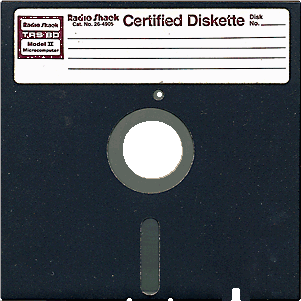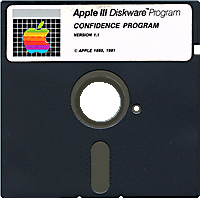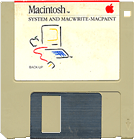Digi-digi-digital!
Storage through the ages - a look back and a guide for the technologically disinclined.
One letter = one character = one byte: "A"
Ten bytes: "0123456789"
A hundred bytes: Haiku or Senryū
A thousand bytes = one kilobyte: A drabble
Ten kilobytes: Worth one, maybe two pictures are worth this
A hundred kilobytes: A novelette or 8-inch floppy disk

A thousand kilobytes = a million bytes = one megabyte: A novel or the later 5.25" or 3.5" floppy disks


Ten megabytes: Proust's In Search of Lost Time, the longest multi-book English novel ever written. Slightly short of five thousand pages. About seven "standard" floppy disks.
A hundred megabytes: A stack of novels as high as I am tall. They would all fit on a single 1994-style Zip Disk

A thousand megabytes = a billion bytes = one gigabyte: one and a half CDs. A respectable personal book collection - perhaps twenty, thirty metres of books.
I currently have a rectangular sliver of plastic on my desk. It's slightly longer and wider than the last joint on my index finger. It's about a millimetre thick, maybe a smidgeon more.
It holds two gigbytes. Say, perhaps, fifty metres of books.
This is by no means any kind of limit. Right now you can buy lightweight plastic bricks about the size of a finger which hold over sixty gigabytes. You can already buy personal computers with thousand-gigabyte (one terabyte) hard disks in them. That's about thirty kilometres of books. A national library archive in a slab of metal and plastic the size of a single paperback.
And today, labs and large computer businesses around the world are using multi-thousand-terabyte (petabyte) digital archives.
One single petabyte is large enough to contain all the words in a stack of paperback books so high that if you laid it down, it would stretch around the entire world.
And the human species currently creates around two hundred thousand petabytes of information every year. That's a stack of novels reaching across the solar system.
Every. Year.
At that rate, it would only take us about four thousand years to write ourselves to the next nearest star. Of course, every year we create more than the year before, so we'll probably hit this point sometime around 2030 instead of the year six thousand.
Given long-term trends in storage, you could probably buy a home computer equivalent at that point which could hold every word ever written by human hand.
Or at the least, all the paperbacks.
One letter = one character = one byte: "A"
Ten bytes: "0123456789"
A hundred bytes: Haiku or Senryū
A thousand bytes = one kilobyte: A drabble
Ten kilobytes: Worth one, maybe two pictures are worth this
A hundred kilobytes: A novelette or 8-inch floppy disk

A thousand kilobytes = a million bytes = one megabyte: A novel or the later 5.25" or 3.5" floppy disks


Ten megabytes: Proust's In Search of Lost Time, the longest multi-book English novel ever written. Slightly short of five thousand pages. About seven "standard" floppy disks.
A hundred megabytes: A stack of novels as high as I am tall. They would all fit on a single 1994-style Zip Disk

A thousand megabytes = a billion bytes = one gigabyte: one and a half CDs. A respectable personal book collection - perhaps twenty, thirty metres of books.
I currently have a rectangular sliver of plastic on my desk. It's slightly longer and wider than the last joint on my index finger. It's about a millimetre thick, maybe a smidgeon more.
It holds two gigbytes. Say, perhaps, fifty metres of books.
This is by no means any kind of limit. Right now you can buy lightweight plastic bricks about the size of a finger which hold over sixty gigabytes. You can already buy personal computers with thousand-gigabyte (one terabyte) hard disks in them. That's about thirty kilometres of books. A national library archive in a slab of metal and plastic the size of a single paperback.
And today, labs and large computer businesses around the world are using multi-thousand-terabyte (petabyte) digital archives.
One single petabyte is large enough to contain all the words in a stack of paperback books so high that if you laid it down, it would stretch around the entire world.
And the human species currently creates around two hundred thousand petabytes of information every year. That's a stack of novels reaching across the solar system.
Every. Year.
At that rate, it would only take us about four thousand years to write ourselves to the next nearest star. Of course, every year we create more than the year before, so we'll probably hit this point sometime around 2030 instead of the year six thousand.
Given long-term trends in storage, you could probably buy a home computer equivalent at that point which could hold every word ever written by human hand.
Or at the least, all the paperbacks.